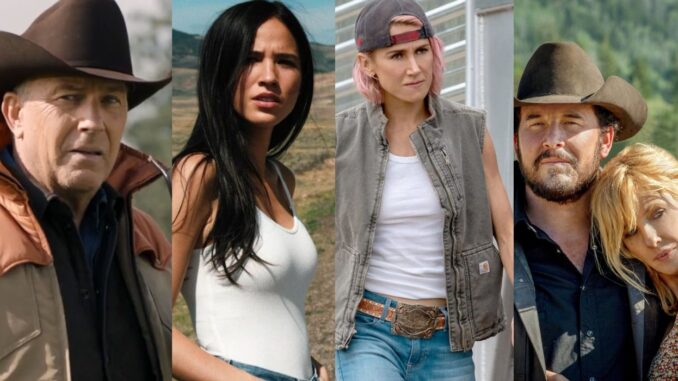
The American West has always been a canvas for grand narratives, a landscape where myth and reality blurred into tales of rugged individualism, boundless freedom, and the endless horizon. For decades, the cowboy, stoic and steadfast, was the genre’s emblem. Yet, in an era dominated by sprawling urban sagas and sci-fi epics, a television series rode into view, spurs clinking and dust flying, to redefine what it means to be a modern cowboy, and in doing so, decodified an irresistible appeal that captivated millions: Yellowstone.
At its core, Yellowstone‘s magnetic pull lies in its masterful weaving of primal human desires with the stark, breathtaking beauty of the Montana wilderness. It’s a series that doesn’t just feature land; it worships it. The sprawling Yellowstone Dutton Ranch isn’t merely property; it’s a character itself, a living, breathing testament to a rugged individualism battling the relentless encroachment of modernity. This deep-seated connection to the earth, the fight to preserve a legacy against all odds—developers, politicians, Native American land claims—taps into an almost ancestral yearning for belonging and sovereignty. In a world increasingly homogenized and transient, the Duttons’ unwavering, often violent, commitment to “the ranch” offers a visceral fantasy of permanence, of a place worth fighting, and dying, for. Viewers are drawn to the sheer audacity of John Dutton, the patriarch, who wields his wealth, influence, and sheer willpower like a branding iron, marking his territory and his family as untouchable.
Beyond the land, the appeal deepens into the tumultuous currents of family and power. The Dutton clan is a glorious mess: fiercely loyal, deeply dysfunctional, and utterly compelling. Beth Dutton, with her razor-sharp wit, bottomless reservoir of rage, and unshakeable love for her father and Rip, is a force of nature. Kayce, the tormented ex-Navy SEAL caught between two worlds; Jamie, the brilliant, insecure lawyer perpetually yearning for his father’s approval; and Rip Wheeler, the ultimate loyal enforcer, shaped by violence yet capable of profound tenderness—these are not just characters; they are archetypes elevated to mythical status. They operate in a world where moral lines are not just blurred but often violently erased. This moral ambiguity is incredibly liberating for an audience accustomed to clear-cut heroes and villains. The Duttons commit heinous acts, but always—in their own twisted logic—for the preservation of their family and their way of life. It’s a cathartic wish-fulfillment, allowing viewers to vicariously experience the raw power of those who play by their own rules, unburdened by societal niceties.
This brings us to Yellowstone‘s revolutionary impact on the modern cowboy genre. Historically, Westerns were often morality plays set against a vast backdrop, with clear demarcations between good and evil, lawmen and outlaws. The cowboy was a figure of stoic heroism, a lone wolf dispensing justice. Yellowstone shatters this pristine image. Its cowboys still ride horses, wear hats, and work cattle, but they are also deeply flawed, psychologically complex individuals grappling with contemporary issues. They are not just gunslingers; they are businessmen, politicians, and traumatized survivors.
The show redefines the cowboy not as a relic of the past, but as a dynamic, evolving figure confronting 21st-century challenges with a deeply ingrained 19th-century ethos. The conflicts are no longer solely about cattle rustling; they are about land development, environmental regulations, corporate greed, political maneuvering, and indigenous rights. The “outlaws” are now corporate lawyers and land developers, and the “lawmen” are often the Duttons themselves, operating outside or above the official legal framework. When modern institutions fail them, they revert to primal solutions—intimidation, violence, and unwavering familial loyalty—proving that the spirit of the old West still echoes loudly, albeit with a modern, blood-soaked twist.
Take Rip Wheeler, for instance. He is the quintessential cowboy—hard-bitten, loyal to a fault, a master of the ranch. But he’s also an emotionally scarred man with a dark past, capable of both brutal violence and surprising tenderness. He embodies the paradox of the modern cowboy: a man of tradition who must navigate a world that constantly threatens to extinguish it, resorting to morally questionable means to protect his chosen family. His journey, and that of the Duttons, is a gritty exploration of what happens when the old ways collide with a new world, forcing the cowboy to adapt, to shed his idealism, and to embrace a darker, more pragmatic code.
In essence, Yellowstone decodes its appeal by tapping into universal human desires for power, legacy, and belonging, all set against a stunning, wild landscape. It redefines the modern cowboy not by discarding the genre’s tropes, but by twisting them, imbuing them with a psychological depth and contemporary relevance that makes the archetypal Western figure resonate with a new generation. It’s a sprawling saga that reminds us that even in our hyper-connected, digital age, there’s still an enduring fascination with the untamed, with the fight for what’s yours, and with the complex, often morally ambiguous, heart of the modern cowboy. It’s not just a show; it’s a visceral, intoxicating journey into the soul of a re-imagined American myth.
